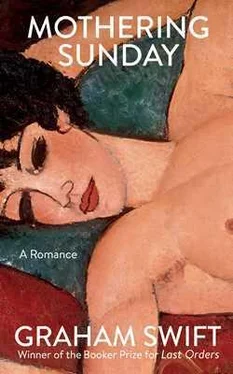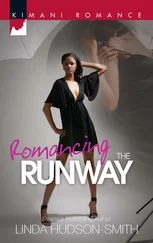In any case she had got the job. And Mr Niven must have understood what a big step it was for her and that she was fully determined to take it, since when she left he gave her ten pounds (ten pounds!) with which to set herself up in Oxford. And she had anyway the money she’d saved from her maid’s wages (not having a family that had any call on them), not to mention from the occasional half-crowns and florins Mr Niven would bestow on her.
Mr Niven had learnt economy, but there were still the vestiges of largesse.
By this time Milly had left and there was a new cook called Winifred, and there would soon be a new maid too. And she, Jane Fairchild, would never know what became of Beechwood or Upleigh. She would never go back. It was almost a superstition. Some things, some places perhaps take up their truer existence in the mind. Even when she had a car — especially when she had a car — she would never go back, even just to drive by, to stop and look and wonder.
She went to Oxford, to work for Mr Paxton. She was only an assistant in a bookshop, but an able one, increasingly familiar with books and — what perhaps mattered most — very good with customers, who ranged from mere townsfolk to the cream of the university, even professors. It soon became clear to Mr Paxton that he had acquired an asset. And it became clear soon enough too that the increasing familiarity with books went with an increasing familiarity with the customers.
The fact was that she began to consort, to go out, even to go to bed with some of them, and it wouldn’t have been wrong to say that this is what she had hoped, even vaguely foreseen. If she couldn’t have ‘gone to Oxford’ in the other sense, then she became intimate with those who had. It might even be said that she moved in university ‘circles’ even more freely and successfully than many — poor swots that they were — who were actually there . She could even pass herself off quite convincingly as that rare and frightening creature, a female undergraduate.
‘And what are you studying?’
‘Studying? Oh no, I’m just a shop girl.’
It was remarkable how their eyes might light up.
And later on she might dare to say, ‘I’m a shop girl, but — I write too.’
One day, in the little back office, Mr Paxton, close observer of all this and committed family man, had said, ‘I’m going to get a new typewriter, Jane. This thing has seen better days.’ There was an awkwardly stoical look in his eye as if he might have been talking about himself. The old typewriter was perfectly serviceable.
‘Would you like it?’ he said.
And that, you might say, was when she really became a writer. The third time. As well as at birth. As well as one fine day in March, when she was a maid.
Her Oxford days! Her Oxford years! Oh they were great days. She saw Oxford all right. It was an education. And, to be perfectly honest, she was sometimes in some respects the educator. Even of some of the best brains in the land. How many, in Oxford? Oh, she couldn’t remember now. And of course it was in Oxford that she met her husband, Donald Campion. But that was a whole other story. It was funny how you could say even of life itself: that was another story.
‘It wasn’t the smoothest of marriages, was it? You and Donald Campion?’
‘What makes you say that?’
‘Well — two minds. Two careers. He was the bright young philosopher, wasn’t he?’
She didn’t say, ‘It was a thing of bodies too.’ Though at eighty she might have got away with it. If the truth be known — but Donald himself had never known it — Donald had reminded her of Paul Sheringham. And she certainly wasn’t going to reveal that in an interview.
‘You mean there wouldn’t have been room for both his books and mine?’ But she didn’t say that either. She could clam up sometimes just as effectively as she could quip. What a good mask it was, being turned eighty, with a face like a squeezed-out dish mop.
‘And — so tragically short.’ Her interviewer blundered on.
‘Donald or the marriage?’ But she didn’t say that either.
‘Yes, it was tragic,’ she said, with a voice like flint. And didn’t say, as she might have done — at eighty she could be oracular: We are all fuel. We are born, and we burn, some of us more quickly than others. There are different kinds of combustion. But not to burn, never to catch fire at all, that would be the sad life, wouldn’t it?
But she’d said it anyway, or something like it, in a book somewhere. And if the truth be known, grief at Donald’s death, the second grief of her life, was like the end of her own life. She might have jumped on his pyre. Instead of which she became a better and famous writer.
In the Mind’s Eye . It wasn’t published, it wasn’t finished — in some ways, it wasn’t even begun —till after Donald was taken away from her in the autumn of 1945 by a brain tumour. His bleak joke was that he’d been too brainy. Another was that there’d be no chance now of his breaking any Secrets Act. He had safely survived the war as a code-breaker, and his best work was perhaps still to come. It would all now, she thought — her own bleak joke — be like a work of fiction.
‘We had the same quandary, you know, Donald and I. Words and things.’
She had toyed with All in the Mind . She had even toyed with Secrets Act . But fancy publishing a novel called that. In the Mind’s Eye . . All in the Mind . . Either way, it sounded abstract, even rather cerebral. Ha! Twelve years the wife of a philosopher.
In fact it was her most physical, her most carnal, her most downright sexual book. She had found a way, at last, of writing about all that stuff . And it was her first big success. She was forty-eight, not so old (there are some mercies) for a writer, but too old to be the mother that, for her own reasons, she’d always shied away from being. You might say she was given no good examples in motherhood. Except Milly. Now, with Donald and his blue-grey gaze and his rat-a-tat laugh gone, she wished she’d yielded.
Forty-eight and famous. In the Mind’s Eye . Some people were shocked and scandalised. It was only 1950. It would look tame in twenty years’ time. And she was — to make it worse — a ‘lady novelist’. A lady novelist? Where did they get that phrase from? And where did they think she came from?
Forty-eight and famous and widowed and childless and not yet halfway through her orphaned life.
‘I have some distressing news.’
Even as Mr Niven spoke, words displayed their fickle ability to fly away from things. Such was his evident struggle to find words and such her recent experience that she thought he’d said ‘undressing news’. I have some undressing news. A mistake that even Milly couldn’t have made.
And when, after he’d got more words out, he said, ‘You have gone very pale, Jane,’ she had the fleeting thought that it was surely something people only did in books. People only ‘went pale’ or had ‘faces of thunder’ or eyes that ‘flashed fire’ or blood that ‘ran cold’ in books. Books that she had read.
‘I’m so sorry, Jane, to be telling you this. On Mothering Sunday.’
As if his presence — it seemed now that he was alone — back here at Beechwood at this hour was expressly to deliver news meant for her. As if he had come with the unexpected information that she had no mother.
‘There has been an accident, Jane. A fatal accident. Involving Paul Sheringham. Mister Paul at Upleigh.’
She had the presence of mind, or mere mumbling reflex, to say, ‘At Upleigh?’
‘No, Jane, not at Upleigh. A road accident. A car accident.’
That was when he said, ‘You have gone very pale, Jane.’ It even seemed that he was stepping forward, arms held out, a little hesitantly but gallantly, because he thought she might be going to faint.
Читать дальше












